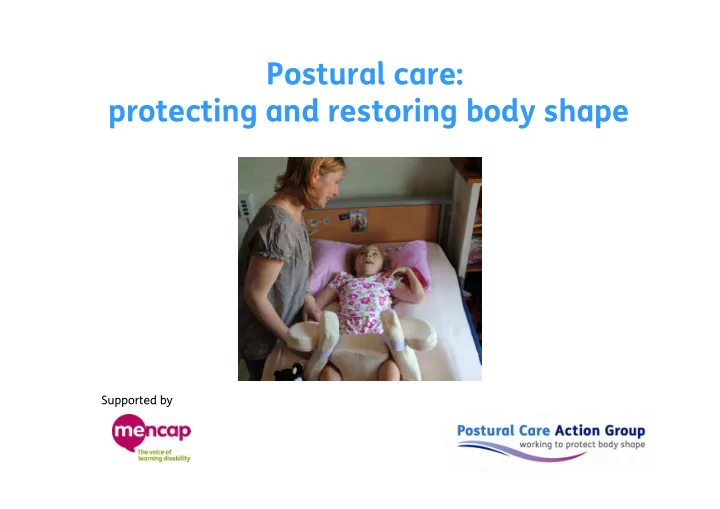

Postural care: protecting and restoring body shape Supported by
Who needs to know about postural care? • Everyone who supports someone with multiple disabilities • Commissioners of health services
People often assume that body shape distortion is inevitable for people with multiple disabilities, but that is not the case With correct positioning, body shape distortion is preventable and can even be corrected later in life
Failure to protect someone’s body shape can have serious consequences for a person’s health and quality of life It can even cause premature death
What is postural care? • People who find it hard to move are most at risk. This is because they often sit and lie in limited positions • Postural care is about using the right equipment and positioning techniques • The earlier the intervention, the better – but it is never too late
The current situation • Many people do not understand its importance • Provision of postural care services is patchy • Some people are having their body shape protected in the day but not at night
What do we want? The members of the Postural Care Action Group want: • To challenge the assumption that distortion of body shape is inevitable for people with multiple disabilities • Protection of body shape, 24 hours a day
‘Many people, like us, are unaware of how important posture is for those we are caring for. We are allowing problems to arise through ignorance.’ Parent
Why is postural care important? Failure to protect body shape can result in lots of health complications. For example: • Contractures • Scoliosis • Difficulty breathing • Poor digestion • Constipation • Pressure on internal organs These complications can cause suffering, pain and even death
There is growing awareness about the importance of postural care • Healthcare for All (Michael, 2008) • Raising our sights: services for adults with profound intellectual and multiple disabilities (Mansell, 2010)
Benefits of postural care • The health and well being of individuals • It reduces the need for invasive and expensive interventions, including surgical procedures. So it can save commissioners money
‘ ...it has improved his health and well-being. The cost savings are also clear as it has meant a reduction of recurrent pressure sores, better reflux management, reduced chest infections and reduced pain, meaning there is less need for medication and hospital admissions. He has also needed less staff input for his behaviour, which had become challenging due to the pain he was in. The need for spinal surgery, which can be very expensive, has been reduced too.’ Health professional
What postural care services are needed? • Information • Training • Postural care pathway early identification assessment training postural care plan getting the right equipment ongoing monitoring and reviewing • Funding
Make postural care a priority! • All health professionals should be thinking about postural care • Annual health checks should include checks for postural care needs • The support a person needs to protect their body shape should be outlined in their health action plan (HAP)
For more information • Watch our film and download our postural care leaflet at www.mencap.org.uk/posturalcare • Order free copies of the leaflet and the film at Email publications@mencap.org.uk Call 020 7696 6900 • Contact Postural Care Skills Go to www.posturalcareskills.com Email info@posturalcareskills.com • Contact PAMIS (Scotland only) Go to www.pamis.org.uk Email pamis@dundee.ac.uk
Take action! • Work with your learning disability partnership board to make sure postural care is included in your local health strategy • Show the leaflet and the film to health professionals and commissioners • Visit or write to your local MP • Tell the Postural Care Action Group and they will also write to your local health commissioner Email campaigns@mencap.org.uk Call 020 7696 5613
Postural Care Action Group Organisations: Individuals: Janet Cobb, independent consultant Elspeth Dixon, parent, and learning disability specialist Physiotherapist Liz Elwell, Partners in Policymaking John and Liz Goldsmith Bas Jansen, physiotherapist Mike and Julie Ormian, family carers Rebecca Ormian, PMLD champion
Recommend
More recommend